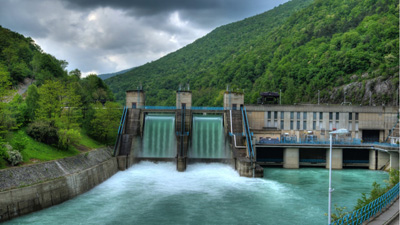Waterless high-density hydro makes more energy from less elevation
Loz Blain
 UK company RheEnergise is quietly rolling out an interesting new approach to pumped hydro energy storage, aiming for a capacity of at least 100 MW by 2030. It works with small hills instead of mountains, making it relevant in many more areas. UK company RheEnergise is quietly rolling out an interesting new approach to pumped hydro energy storage, aiming for a capacity of at least 100 MW by 2030. It works with small hills instead of mountains, making it relevant in many more areas.
It's one of the simplest and lowest-tech ways to store energy and then recover it on demand: use cheap energy during the day to pump a bunch of water up a big hill into a tank, then release it slowly at night, letting gravity do its work and running a turbine to generate energy as and when you need it.
But RheEnergise has added a simple tweak: it doesn't use water. Well, not by itself. It uses a proprietary "high-tech fluid" it calls R-19, which it says is both environmentally neutral and 2.5 times as dense as water.

The result: you can generate the same power from just 40% of the elevation change, using tanks just 40% of the size. That "dramatically" cuts down on materials and installation costs – and thus energy storage costs – and since the tanks are so much smaller, they're often able to be buried underground.
So what is this R-19 fluid? Well, it's a secret sauce, so RheEnergise isn't saying. But we do know it ships as a powder that's added to water to form a pasty-looking high-density goop. And the company says it's "ultra-cheap."
The dense, heavy fluid shrinks the size of hydro installations, or generates 2.5 times more power using existing facilities
RheEnergise
Individual projects are designed to feed between 10-50 MW of energy back into the grid on demand, and since you don't need such a big hill to make it work, it could play a significant role in the renewable energy transition, storing bulk power that can be released to cover daily, weekly or even seasonal renewable energy shortfalls.
RheEnergise has just signed an agreement with fellow UK company Mercia Power Response, aiming to deploy 100 MW of R-19-driven energy storage by 2030 at Mercia's existing grid connections and planned installations.
RheEnergise says it's identified more than 6,500 potential sites in the UK alone, and that its solution costs less than lithium-ion "big battery" projects – although in lithium's defense, batteries will certainly have a higher instant output power, making them much better for load peak smoothing. Slower technologies like this one will shine in longer-duration storage, when it's time to deliver reliable base load power in bulk.
Check out a short video below.

Loz has been one of our most versatile contributors since 2007, and has since proven himself as a photographer, videographer, presenter, producer and podcast engineer, as well as a senior features writer. Joining the team as a motorcycle specialist, he's covered just about everything for New Atlas, concentrating lately on eVTOLs, hydrogen, energy, aviation, audiovisual, weird stuff and things that go fast.
newatlas.com
| 

